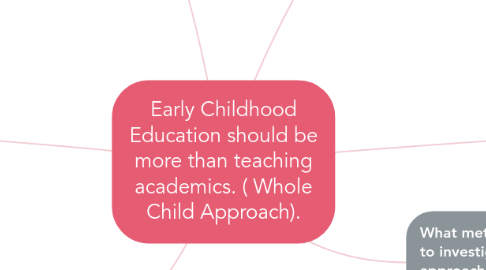Early Childhood Education should be more than teaching academics. ( Whole Child Approach).
by Alexis Laflam

1. Why does it still matter?
1.1. Whole Child approach ensures that children are ready in all developmental areas to succeed through schooling and life.
1.2. The whole child approach is still building each child and their development in all areas, today it is more important than any other time.
1.3. The demands of the 21st century require a new approach to education to fully prepare students for college, career, and citizenship. Research, practice, and common sense confirm that a whole-child approach to education will develop and prepare students for the challenges and opportunities of today (ASCD)
2. What do we know about the whole child approach?
2.1. The objective of the Whole Child Approach is not just to improve students’ academic performances, but also contribute to their overall development. (K12 Development)
2.2. Builds a child's: Self- Awareness skills, Self management skills, social awareness, decision making, relationship management (YODER 2014)
2.3. The whole child approach is a way for children to achieve goals that are not pertained to only academics like the ABC's and Numbers, it helps with socialization, and other development areas.
3. What theories help us understand the issue of whole child approach?
3.1. Frued's Theory- Experiences and events shape a person (Cherry 2019)
3.2. Erikson's Theory: Psychological Growth helps with the development of children, children up to 5 have the most developmental stages. (Cherry 2019)
3.3. Albert Bandura Social Learning Theory, social and emotional learning is just as important as academics in young children :
4. Why is the whole child approach important? Who is it important to?
4.1. SEL promotes activities that develop children’s ability to recognize and manage emotions, build relationships, solve interpersonal problems, and make effective and ethical decisions (Payton et al., 2000)
4.2. A whole child approach, which ensures that each student is healthy, safe, engaged, supported, and challenged, sets the standard for comprehensive, sustainable school improvement and provides for long-term student success. (ASCD 2015)
4.3. Whole child approach is important to the child and their development, families and educators.
5. How has it been addressed?
5.1. A website called ASCD.com gives all information on the why, how, and whats about the whole child approach, giving parents and educators more of a reason to believe in the approach
5.2. The whole child approach has been addressed because it shows how important social and emotional development is, as cognitive development is.
5.3. There are many articles, as well as news and research that has been shown in order to address the importance of the whole child approach, especially in early ed environments.
6. What methods have been used to investigate the whole child approach and current approaches to addressing?
6.1. Brain research conducted in recent decades increasingly affirms that the foundations for both types of skills—cognitive and noncognitive—are established starting at birth, and even before. (WEISS 2016)
6.2. Comparing cognitive and non cognitive abilities along with the connection of the whole child approach vs only academic focused teaching
6.3. The whole child approach is investigated by measuring and creating scales in order to measure a list of non cognitive skills and the connected approach to cognitive skills.


